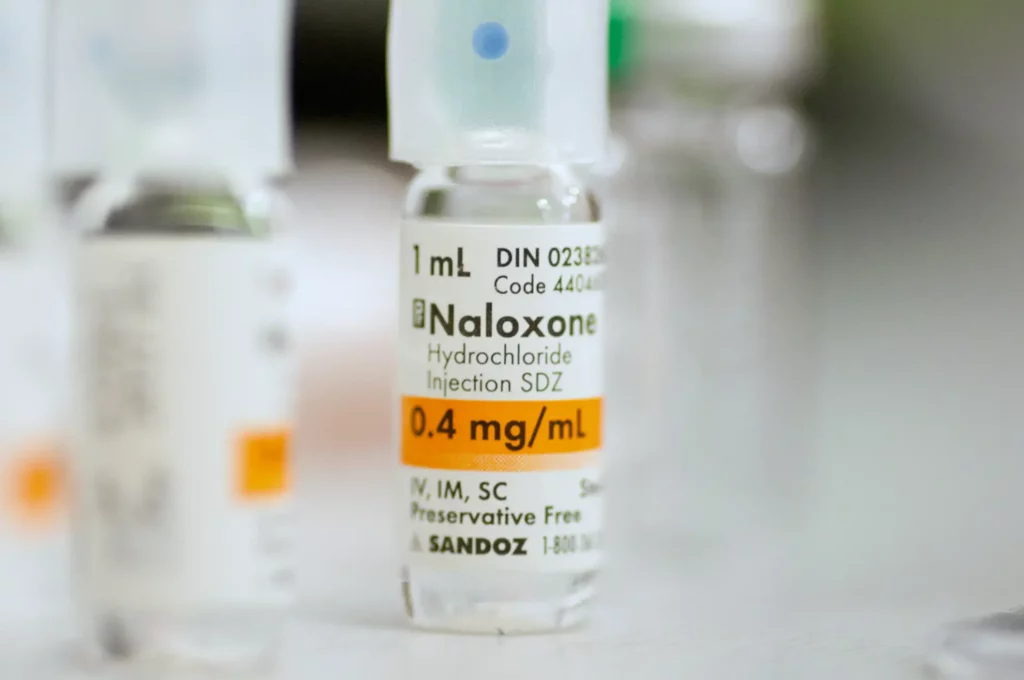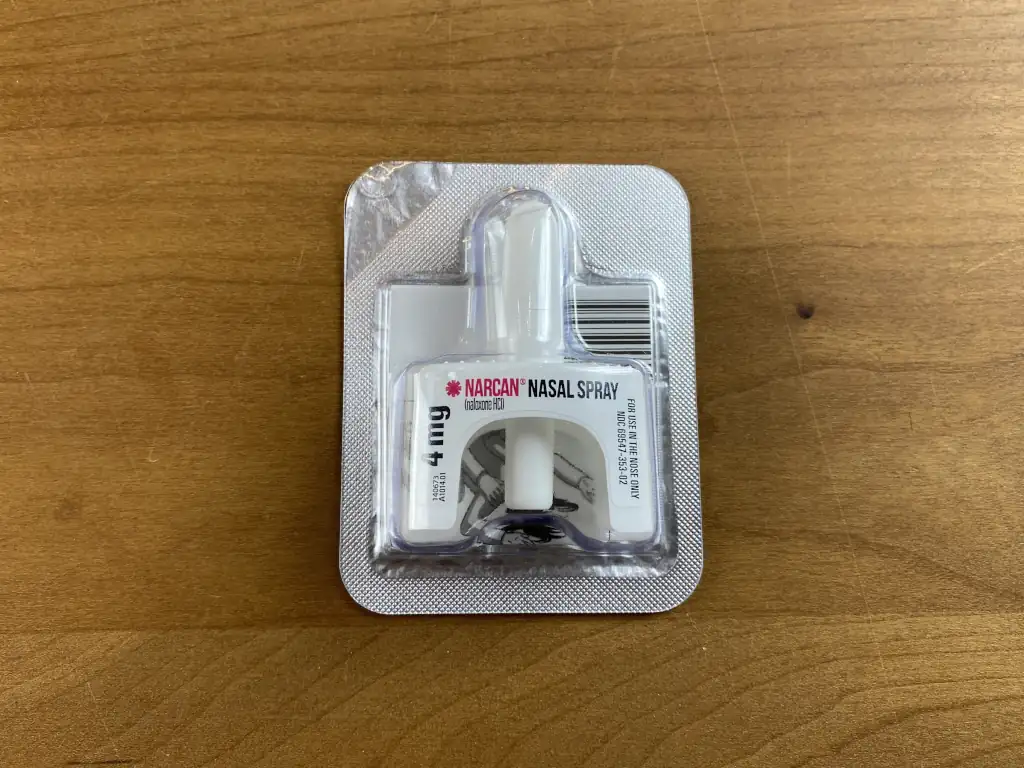Narcan is generic Naloxone. Naloxone is a medication used to rapidly reverse overdoses.
Naloxone is sold under several generic names, including:
- Narcan
- Evzio
- Nalone
The generic brands of naloxone intranasal spray include:
- Narcan Nasal Spray
- Naloxone Hydrochloride Nasal Spray (by several different manufacturers)
- Naloxone Nasal Spray (by several different manufacturers)
Narcan is available as an intranasal spray and injectable solution. Narcan blocks the effects of opioids, hence Narcan is an opioid antagonist.
Read on to learn everything you want to know about Narcan. In this article we will interchange the popular term Narcan with Naloxone when indicated.

Good Samaritan Law and Opioid Overdose
The United States Government Accountability Office (GAO) went over studies to determine the the effectiveness of Good Samaritan laws and if they reduce overdose deaths.
Forty-seven states and Washington D.C. have enacted both Good Samaritan and Naloxone Access laws.
Kansas, Texas and Wyoming do not have a Good Samaritan law for drug overdoses but have a Naloxone Access law.
The findings show a lower rate of opioid-related overdose deaths among states that have enacted Good Samaritan laws, compared to death rates prior to a law’s enactment and death rates in states without such laws.
When police officers or first responders who will carry Naloxone administer the Narcan to someone overdosing, they are following the Good Samaritan Law. In many states there is no consequences to the person saving a life, however, the person whose life was saved, can face various charges for types of drug offenses but not for being opioid dependent and needing the emergency treatment.
The FDA Announced Narcan Nasal Spray Is Now Available For Over-The-Counter Use
Narcan intranasal spray – referred to as “nasal spray” is a drug used to rapidly reverse opioid overdoses. The spray contains naloxone hydrochloride, which is an opioid antagonist that blocks the effects of opioids reversing respiratory depression.
Previously, Narcan nasal spray was a prescription drug. The importance of making naloxone more widely available to help prevent drug overdose deaths drove the U.S. Food and Drug Administration (FDA) to approve Narcan as a spray for over-the-counter use.
Anyone can now purchase Narcan, naloxone hydrochloride nasal spray for over-the-counter (OTC), nonprescription, use – the first naloxone product approved for use without a prescription. It is hoped that in addition to drug stores, the OTC product will be available in grocery stores, convenience stores, and gas stations.
Doing away with prescription naloxone and making the over-the-counter Naloxone product approved as Narcan nasal spray is an important step in addressing the overdose crisis and saving lives. By changing the prescription status and making it an affordable price, more people will be able to respond quickly and effectively to opioid overdoses and potentially prevent deaths.

What is Narcan?
Narcan is a generic Naloxone. Narcan is a prescription drug used to rapidly reverse the effects of overdose from opiates. Someone with a physical dependence on opioids may have withdrawal symptoms within minutes after they are given naloxone.
Narcan can be administered by injection, auto-injector, or intranasal spray, and is often used by first responders to treat an overdose from opiates.
Withdrawal Symptoms from Narcan
The use of Narcan in individuals who are opioid dependent may result in severe opioid withdrawal symptoms characterized by body aches, diarrhea, increased heart rate (tachycardia), fever, runny nose, sneezing, goose bumps, sweating, yawning, nausea or vomiting, nervousness, restlessness or irritability, shivering or trembling, abdominal cramps, weakness and increased blood pressure. While withdrawal symptoms are uncomfortable, it is usually not life threatening. The risk of death for someone overdosing on opiates is worse than the risk of having a bad reaction to Narcan.
Multiple Doses of Narcan
Multiple doses of Narcan (naloxone) can be required for the treatment of an overdose. Depending on the severity of the overdose, the type and amount of opiates taken, and the individual’s response to the initial dose of Narcan.
A single dose of Narcan may be sufficient to reverse the effects of the opioid and restore normal breathing again. However, multiple doses of Narcan may be required, if the individual has a high tolerance to opioids.
What is the Differences Between Injectable Naloxone and Intranasal Spray Naloxone?
The main difference between Naloxone is their route of administration.
Injectable Naloxone:
- Typically administered via injection into a muscle (intramuscular) or vein (intravenous) by a healthcare professional.
- Available in several forms, including a pre-filled syringe, vial, or auto-injector device.
- Typically works faster than nasal spray naloxone, with effects usually seen within 1-2 minutes.
Intranasal Naloxone
- Spray naloxone (also known as intranasal naloxone) is administered as a mist into the nostrils and is designed to be used by non-medical personnel in emergency situations.
- The intranasal spray is available in a pre-packaged, single-use device that is sprayed into one or both nostrils.
- Spray naloxone works more slowly than injectable naloxone, with effects typically seen within 3-5 minutes.
Both forms of Naloxone are equally effective in reversing the effects of opioid overdose.
When will Over-the-Counter Narcan be Available?
Although Narcan nasal spray was approved for over-the-counter (OTC) use by the U.S. Food and Drug Administration (FDA) in 2021. On March 29, 2023 FDA Commissioner Robert M. Califf, M.D remarked:
“Today’s approval of OTC naloxone nasal spray will help improve access to naloxone, increase the number of locations where it’s available and help reduce opioid overdose deaths throughout the country,” FDA Commissioner Robert M. Califf, M.D., said. “We encourage the manufacturer to make accessibility to the product a priority by making it available as soon as possible and at an affordable price.”
The U.S. Food and Drug Administration (FDA) approved Narcan nasal spray for over-the-counter use, meaning that anyone can now purchase it without a prescription at their local pharmacy. This is an important step in increasing access to Narcan and potentially saving lives in opioid overdose emergencies.
How does Narcan Work?
Narcan the generic name for Naloxone works by binding to the opioid receptors in the brain. Drugs such as heroin, fentanyl, or prescription painkillers bind to these receptors and activate them, which can lead to respiratory depression and other life-threatening effects in an overdose.
When Narcan is administered, it blocks the opioids’ effects reversing respiratory depression. This allows the individual to breathe normally again and can help prevent death from an opioid overdose.
Narcan works quickly and can can be administered by injection, auto-injector, or nasal spray.
Does Narcan Work on a Fentanyl Overdose?
Yes, Narcan is effective in reversing the effects of an overdose from Fentanyl. Fentanyl like other opioids, bind to the same receptors in the brain that regulate breathing, which can cause respiratory depression and even lead to death in overdose.
Narcan is effective in reversing the effects of fentanyl overdose. However, given the potency of fentanyl, higher doses of Narcan may be needed to reverse its effects, and multiple doses may be necessary due to the longer duration of action of fentanyl.
What drugs does Narcan Nasal Spray work on?
Narcan Nasal Spray is primarily used to reverse the effects of an opioid overdose, including prescription pain medications, Fentanyl, Heroin and other illicit opioids.
Narcan may also partially reverse the effects of some other drugs that act on the same receptors in the brain, such as buprenorphine and methadone.
Narcan is not Effective on Cocaine or Benzodiazepines
Narcan is not effective in reversing the effects of drugs that do not act on one’s opioid receptors, such as cocaine or benzodiazepines.
Does Naloxone or Narcan Nasal Spray work on Xylazine?
No, Narcan (naloxone) and Narcan Nasal Spray are not effective in reversing the effects of Xylazine.
Commonly used in veterinary medicine, Xylazine is a sedative and muscle relaxant for large animals such as horses and cattle.
While xylazine acts on some of the same receptors in the brain as opioids, it does not bind to opioid receptors directly, and therefore Narcan would not be effective in reversing its effects.
What is Narcan Used For?
Opioids, such as prescription painkillers, heroin, and fentanyl, can cause respiratory depression, which can be life-threatening if not promptly reversed. Narcan generic name for Naloxone is used to rapidly reverse the effects of an opioid overdose by quickly binding to the same receptors in the brain that opioids bind to and blocking their effects. This can rapidly reverse respiratory depression and other life-threatening effects of an opioid overdose.
How Do You Administer Narcan?
Narcan/Naloxone can be administered by injection, auto-injector, or nasal spray.
- For injection, Narcan is usually given into a muscle, such as the thigh or upper arm. The injection is typically given using a prefilled syringe.
- For auto-injector administration, Narcan is packaged in a single-use device that automatically injects the medication into a muscle when pressed against the skin. This method is designed for ease of use by individuals who may not have medical training.
- Narcan nasal spray is administered by inserting the nozzle into one nostril and pressing the plunger to release the medicine. The spray is absorbed through the nasal mucosa and works quickly to reverse the effects of opioid overdose.
How Long Does Narcan Last?
Narcan/Naloxone effects will typically last for 30-90 minutes. The duration will depend on the dose, the route of administration, and the individual’s response to the medicine.
It is important to note that Narcan temporarily reverses the effects of opioids and does not treat the underlying overdose or addiction.
It is important to monitor an individual closely after administering Narcan, as the effects of opioids may return once the Narcan wears off. It is recommended to stay with the person and seek emergency medical care even if they appear to have recovered after receiving Narcan.
Does Narcan Expire?
Yes, Narcan/Naloxone does expire. Check the expiration date on the packaging before administering the medicine. Expired Narcan may not be as effective in reversing the effects of an opioid overdose.
Narcan is typically good for 18-36 months from the date of manufacture. Narcan should be stored according to the manufacturer’s instructions which is usually at room temperature and not in direct sunlight.
In Closing
It is important to note that Narcan is a medication that should be administered as soon as possible in the event of an opioid overdose. Narcan and Narcan nasal spray is a life-saving medication, it is not a substitute for emergency medical care.
Anyone who suspects an opioid overdose should call 911 and if possible, administer Narcan or Narcan nasal spray while waiting for emergency responders to arrive.
Drug abuse of prescription drugs or illicit opioids carry a risk of addiction, dependence, and overdose. Opioid addiction occurs with repeated use of opioids and other substances that result in compulsive drug seeking and loss of control, which can seem like an endless cycle.
Turning Point of Tampa has been successfully working with those with an opioid use disorder. Since 1987, our medical and clinical team has helped many find a life with out the use of drugs and alcohol. If you or a loved one are facing addiction, you are not alone and we will gladly guide you to find help.
Sources:
https://www.gao.gov/products/gao-21-248

